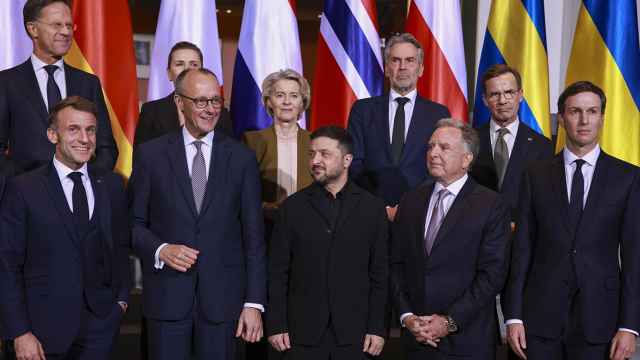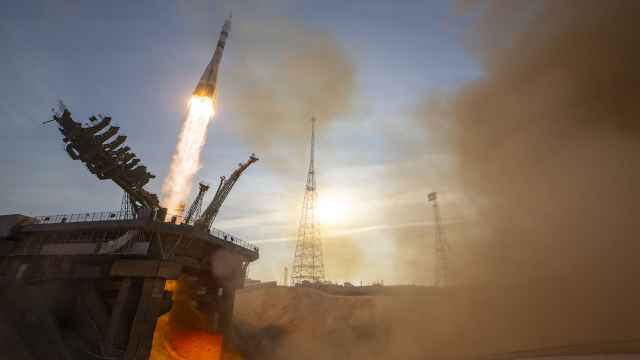DAVOS, Switzerland — It began with the death of an anti-corruption lawyer in a Moscow jail and grew into a spat between Russia and the United States.
Now Russia’s business elites are worried that their interests could be harmed by fallout from the Magnitsky affair.
With international concern spreading after the 2009 death of Hermitage Capital attorney Sergei Magnitsky, some Russian tycoons fear that their legitimate cross-border money transfers will get hit by red tape.
And they complain that the Kremlin’s hard-line stance on Magnitsky is not doing them any favors.
“The Russian business [community] is absolutely united. The situation is more than bad, and things may well spread to the EU and U.K., and God knows who could be sucked in,” said a Russian billionaire, speaking at the World Economic Forum in Davos.
The billionaire asked not to be named because he said the Russian business establishment was still afraid of bringing up the matter with Russian President Vladimir Putin.
In the past decade, Russian business has tried to stay out of politics since the country’s richest man at the time, Mikhail Khodorkovsky, was jailed for tax evasion, a move Putin’s critics say was revenge for Khodorkovsky’s political ambitions.
Russian business elites were at first broadly indifferent to the Magnitsky case. But that changed last year when the United States introduced the Magnitsky Act, imposing sanctions on dozens of Russians accused of being involved in money laundering and the lawyer’s death.
Investigations have taken place in three European countries that are important conduits for money transfers by Russian business.
In Lithuania, the prosecutor’s office said an investigation into suspected money laundering, based on information from Hermitage, is continuing. It has already resulted in the freezing of several bank accounts.
Meanwhile, Estonia’s public prosecutor said police had investigated and decided not to open a criminal case.
Swiss prosecutors have said they are extensively looking into money transfers allegedly made by Russian tax officials and others accused of being involved in Magnitsky’s death.
Although Russian businessmen say they have nothing to fear from such investigations, they worry it will become increasingly difficult to manage global portfolios, which have grown in the past two decades to take in interests ranging from football clubs to French castles.
The biggest concern is that Magnitsky Act-type measures will spread.
“Many more countries will join,” Hermitage boss Bill Browder said. “We believe the EU will impose the Magnitsky sanctions before the end of the year.”
Clearly Browder has an ax to grind, but he says he has heard more and more complaints from Russian executives that the Kremlin needed to investigate the case properly to stop tensions with the United States from spreading and damaging business.
“Russian business is very upset,” economist Sergei Guriev said. “The last development they want is to see the EU or U.K. joining those sanctions. Quite simply, that is where Russian business has huge assets and where their kids are studying.”
Russian officials and bankers say the impact on commerce is becoming far too negative.
“Of course, I have concerns about a worsening in [U.S.-Russian] relations. It creates unease for business,” said German Gref, head of Sberbank. “And it is a question for both sides. What’s the point of continuing all this? I think it is very important to move on.”
“The level of trust between Russian and foreign business is again very low,” said a senior Russian oil executive. “And it is a very bad sign at a time when Russia wants to speed up growth. And that is impossible without foreign investment.”
Economists like Guriev note that the Russian stock market has been one of the worst performers among emerging nations over the past year despite a stable macroeconomic environment.
Kenneth Hersh, CEO at NGP Energy Capital, a U.S.-based energy fund that has $13 billion under management, said he is not investing in Russia due to a general perception of a lack of rule of law and weak regulation.
And he shares concerns that the Magnitsky case is adding to the general perception of Russia as an unattractive place to do business.
“I need higher returns to compensate for that risk,” Hersh said.
Related articles:
A Message from The Moscow Times:
Dear readers,
We are facing unprecedented challenges. Russia's Prosecutor General's Office has designated The Moscow Times as an "undesirable" organization, criminalizing our work and putting our staff at risk of prosecution. This follows our earlier unjust labeling as a "foreign agent."
These actions are direct attempts to silence independent journalism in Russia. The authorities claim our work "discredits the decisions of the Russian leadership." We see things differently: we strive to provide accurate, unbiased reporting on Russia.
We, the journalists of The Moscow Times, refuse to be silenced. But to continue our work, we need your help.
Your support, no matter how small, makes a world of difference. If you can, please support us monthly starting from just $2. It's quick to set up, and every contribution makes a significant impact.
By supporting The Moscow Times, you're defending open, independent journalism in the face of repression. Thank you for standing with us.
Remind me later.





